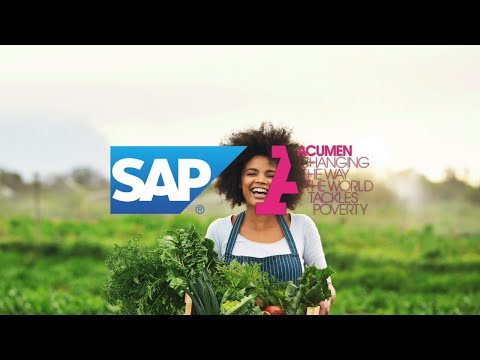As the COVID-19 pandemic devastates marginalized communities, public and private sector leaders — SAP included — have invested in an emergency fund for social entrepreneurs who serve the world’s most vulnerable people.
Led by Acumen, a non-profit organization that invests in companies, leaders, and ideas to tackle poverty, the fund is a radical departure from the group’s typical strategy. Small grants and loans provide an immediate infusion of support to entrepreneurs aiding impacted communities.
“Low-income people already living on the edge, underserved by infrastructure and markets, intensely feel the rippling effect of the pandemic,” said Yasmina Zaidman, chief partnerships officer at Acumen. “We needed to be both nimble and radical, so we created an emergency fund to keep investing in social entrepreneurs during this critical time period.”
Since its inception almost two decades ago, Acumen has disbursed $132 million in equity or debt to 136 companies. With offices in India, Pakistan, Colombia, Kenya, Nigeria, the UK, and the U.S., Acumen has made more than 60 grants and loans through its emergency fund to social entrepreneurs that support people with training and education, reliable employment opportunities, and more. Here are three of their stories.

Food with Purpose from Field to Table
Acumen has provided significant relief — both business-wise and on a personal level — to SiembraViva, a social entrepreneur in Colombia that brings healthy food to people in cities by supporting local smallholder farmers in rural communities. When the coronavirus hit, Founder and Chief Executive Officer (CEO) Diego Benitez shifted operations, expanding its selection of foods as well as increasing direct-to-consumer sales.
“As a small business owner, the challenges can get overwhelming,” Benitez said. “Acumen has been there with funds, practical strategies, and professional coaching. With their help, we created a finance committee to better manage cash flow. Having someone to talk with was just as important psychologically, helping us stay focused even as we changed our business model.”
A self-described food system “hacker,” SiembraViva provides hands-on training for farmers to become certified in organic, regenerative agriculture. When crops are harvested, the for-profit company helps farmers distribute and sell them at high-volume market prices. SiembraViva’s in-person and digital training curriculum provides farmers with “bio inputs,” including organic fertilizers, soil improvers, and pest control, as well as planting instructions for high-demand products. Despite the pandemic, SiembraViva had experienced growth of 87 percent in the number of participating farmers and more than 60 percent in sales in the first half of this year compared to 2019. The company has also reduced food waste by 20 percent compared to conventional practices.
Funding Profitable Relationships with Farmers
Bridgetta Amoateng, co-founder and CEO of Lambano Limited in Sierra Leone, is an Acumen fellow who has applied her emergency funding to prevent employee layoffs, open up a new channel delivering groceries on motorbikes, and purchase technology for remote farmer education.
“During this pandemic, we had to step up and take action,” Amoateng said. “We began providing farmers with ingredients for meals to cushion the impact of the pandemic, helping their families and extended community. At the same time, we increased food sales by 50 percent with our deliveries.”
Born and raised in Sierra Leone, Amoateng was aware of the challenges local farmers faced even before the pandemic. Her for-profit company provides interest-free loans of seeds, fertilizer, and animal feed to local farmers, many of whom are women. Lambano builds relationships with these motivated farmers, providing hands-on training in high-yield crop production, including cultivation and plowing. The organization buys the farmer’s harvested crops at market value and processes the ingredients for packaged food sales.
Looking ahead, Amoateng hopes to support more farmers and pursue new opportunities, such as online selling.
“The need is so great for our services that we’ve had to turn people away – women with children on their backs – and we’d like to expand our ability to help farmers earn a self-sustainable livelihood,” she said. “Now that people have seen value in increasing their productivity and profits, they ask us to keep coming back and working with them.”
Education Leader Adapts to Fast-Moving Crisis
When COVID-19 shut down KEEP Liberia’s in-person storytelling sessions in reading rooms nationwide, the non-profit organization increased the number of students it reached by using money from Acumen’s emergency fund for interactive television and radio broadcasts. It also purchased and distributed phones that students used to access government-sponsored education sessions on the radio, preinstalling some of the devices with their storytelling sessions.
“The grant from Acumen helped us keep our doors open, making sure children remained academically engaged,” said Brenda Moore, executive director at KEEP Liberia. “We’ve amplified our social media presence and can also stay in touch with calls to families, tracking their children’s progress and emotional well-being. We’ve kept our staff employed and continued to conduct our all-important ongoing fundraising efforts.”
Originally founded during the Ebola outbreak, KEEP Liberia offers community programs designed to promote a culture of reading in children and self-sufficiency in their parents. It is no easy feat in a country where only 10 percent of people have regular access to electricity. Children from pre-school through grade 12 participate – now remotely – in after-school storytelling sessions. During broadcasts, typically aired multiple times each week, teachers encourage children to listen, ask questions, and tell their own stories. Meantime, their mothers can participate in skills-training programs as well as micro-savings and loan programs to start or expand a business.
“We wanted to instill a passion for reading and learning in children from a very young age, so we stocked our libraries with leisure books – folk tales, storybooks, and novels,” said Moore. “Once someone’s reading, writing, and thinking skills are solid early on, their potential to excel in other subjects is equally strong.”
KEEP Liberia has trained more than 50 teachers in reading strategies, and now has almost 20 libraries located in over half of the country’s townships.
Tackling Systematic Inequity Everywhere
Zaidman was optimistic about applying lessons learned during the pandemic to the wider world.
“I’m proud of the relationship we have with SAP because we both see social entrepreneurs as a source of innovation and are constantly trying to find new ways of overcoming the challenges of poverty,” she said. “We’ve learned a lot about how enterprises can pivot to address systemic issues associated with poverty. Those insights will be valuable more broadly to help us build a more resilient and equitable society when this crisis is over.”
Follow me: @smgaler
This story originally appeared on SAP BrandVoice on Forbes.



